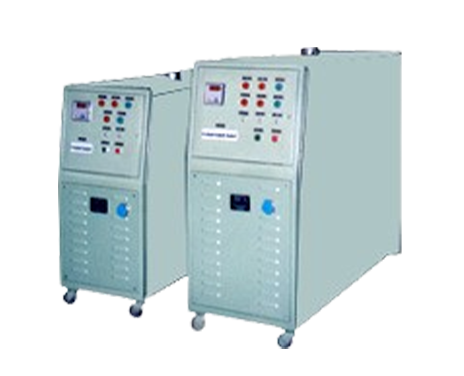
One of the important factor, to be considered in moulding of engineering thermoplastic materials is mould temperature. It is very essential to maintain optimum temperature in the mould while processing, to obtain perfect and precision moulded component. Elmec Heaters & Controllers has designed a compact mould temperature controller that heats and cools the mould to maintain optimum temperature in the mould.
| Mould Tempreature Controller Specifications | |||||
|---|---|---|---|---|---|
| Model | PMTC-3 | PMTC-6 | PMTC-8 | PMTC-12 | PMTC-16 |
| Oil Capacity (Ltrs) | 25 | 35 | 40 | 50 | 60 |
| Pump pr (ksc) | 6 | 6 | 6 | 8 | 8 |
| Flow rate (LPM) | 21 | 41 | 41 | 40 | 40 |
| Heater Load (KW) | 3 | 6 | 8 | 12 | 16 |
| Cooler Cap (kcal/hr) | 2500 | 3000 | 4000 | 5500 | 9000 |
| Motor Rating (HP) | 0.75 | 1 | 1 | 1.5 | 1.5 |
| Max temp(C) | 120 | 180 | 180 | 250 | 250 |
| Length(mm) | 750 | 750 | 750 | 1200 | 1500 |
| Breadth(mm) | 400 | 450 | 450 | 500 | 600 |
| Height(mm) | 630 | 630 | 700 | 1000 | 1250 |
Mould temperature controllers are devices designed to heat and cool the mould during injection moulding or other plastic processing, ensuring the mould stays at an optimal temperature. This is crucial for achieving precision, consistent quality, and improved surface finish in moulded components
Mould temperature controllers are compact, fully automatic units with oil as the standard circulating medium (water is optional). They include automatic water cooling, a safety thermostat for protection, and efficient temperature control with accuracy up to ±2°C or even ±0°C in advanced models.
Using an MTC ensures uniform temperature distribution, reduces cycle time, minimizes warpage and shrinkage, and improves surface finish, resulting in higher precision and consistency in molded components.
Our MTCs are built with corrosion-resistant components, PID digital temperature controllers, stainless steel pumps, and thermal overload protection, ensuring stable operation in Indian industrial conditions.
An MTC should be used whenever dimensional accuracy, surface quality, and molding speed are critical—especially for engineering plastics, precision components, and multi-cavity molds.
